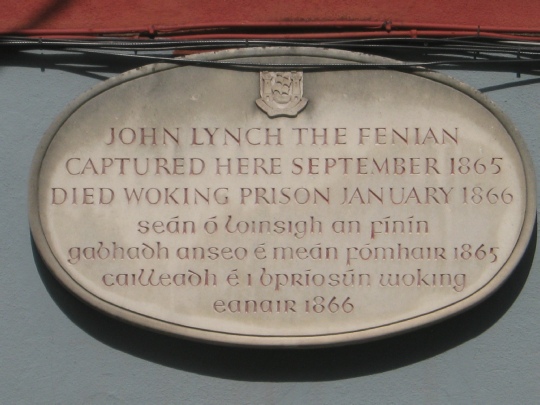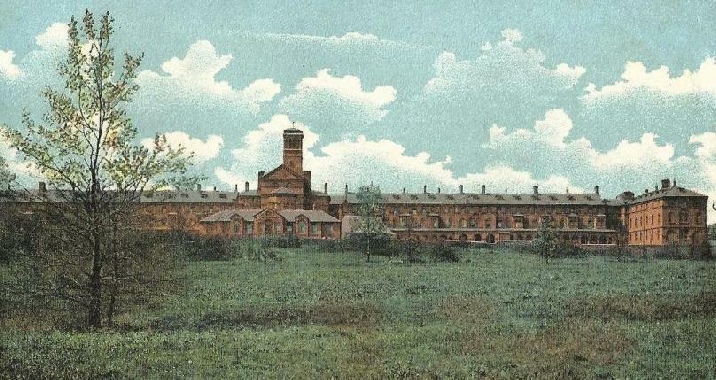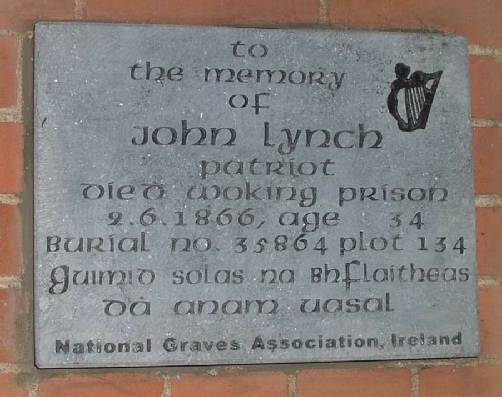

© John Clarke 2014-
John Clarke
Historian of Brookwood Cemetery

John Lynch

Commemorative plaque to John Lynch in Devonshire Street, Cork.
JOHN LYNCH was a widower and former publican who became a legal clerk and lodged in Cork City. He became involved with the Cork City Fenians and was a member of the Irish Republican Brotherhood. He attended seditious meetings in public houses, took part in military drills and lectures, and was present outside the city when 400 Fenians were inspected by an American envoy. Lynch was convicted on the word of an informer, John Warner, who stated that Lynch was an ‘A’ (or colonel) in the Fenian organisation in Cork. Lynch was found to own an old shotgun and sword, and was convicted of treason and felony by Judge Keogh on 14 December 1865.
During his trial, letters to his girlfriend Bridget Noonan were used in evidence. They revealed his expectation of a Fenian rising and also his sense of humour. Evidence was also given concerning Lynch’s weak chest and constitution. Overall the evidence used to convict him was pretty thin for the sentence of 10 years’ penal servitude. Overall he appears to have been convicted on the evidence given by the informer who caused his arrest.
Lynch was first sent to Pentonville. In December 1865, due to a chest infection, Lynch was moved to the hospital at Woking Prison. Other inmates at Woking included Jeremiah O’Donovan Rossa (an editor of the Irish News), Captain Richard O’Sullivan Burke (retired from the 15th Regiment of the US Army), Captain Timothy Deasy (of the 9th Massachusetts Infantry Volunteers), Brian Dillon (a law clerk and also from Cork and who died in 1872 shortly after his release from Woking Prison), and Charles Kickham (who had lost his sight in a gunpowder accident as a boy; he was on the editorial staff of the Fenian newspaper The Irish People and whose novel Knocknagow was an Irish bestseller).

Here is Rossa’s account of Lynch's imprisonment at Woking. It is quoted from a letter by Rossa that was smuggled out of prison. Jenny Marx subsequently used its contents to draw attention to these prisoners and the conditions they had to endure. Since these articles would have been deemed seditious by the English authorities, she published them under the pen name “J. Williams” for the French newspaper La Marseillaise. This particular article was dated 9th March 1870:
I must say a word in memory of John Lynch. In March 1866 I found myself together with him in the exercise yard. We were being watched so closely that he only managed to say to me, “The cold is killing me.” But then what did the English do to us? They took us to London on Christmas Eve. When we arrived at the prison they took away our flannels and left us shivering in our cells for several months. Yes, they cannot deny that it was they who killed John Lynch. But nevertheless they managed to produce officials at the enquiry who were ready to prove that Lynch and Duffy had been given very gentle treatment.
John Lynch whispered to me one day, “Rossa, the cold is killing me.” And it did kill the poor fellow. I missed him from the exercise ground shortly thereafter. He sank under the treatment ordered for us by the State authority.
Lynch died in Woking Prison on 6th June 1866 and was buried in the Catholic section of the pauper ground in the cemetery. The precise location of this area is not now known, but would be in the woodland beyond plot 134.
In 2002, Charles McLauchlan contacted the Society to see if we could confirm that Lynch was in fact buried in the cemetery. The reason for his enquiry was that the National Graves Association of Ireland seeks to erect memorials and mark the burial places of Irish patriots. Its research was now moving into the lesser known names in Ireland’s history, and one of the Association’s tasks is to confirm dates of death and details of burials. The Association can trace its origins back to 1867 when it was known as the “Memorial Committee” whose main function was to care for the graves of deceased patriots.
I was able to confirm that Lynch was buried at Brookwood, and from the burial registers I was able to confirm his exact date of death. We understand that the National Graves Association will be approaching Mr. Guney for permission to erect a marker to his memory within the cemetery. Prior to this, Lynch’s only memorial was that his name appears on the National Monument in Cork City, Ireland, and a plaque in his memory in Devonshire Street, Cork, illustrated at the head of this article. Subsequently the National Graves Association was able to erect a plaque on the Cemetery Chapel. This is illustrated below.

[From The Brookwood Express, August 2002]
Copyright © 2002 by John M. Clarke All Rights Reserved